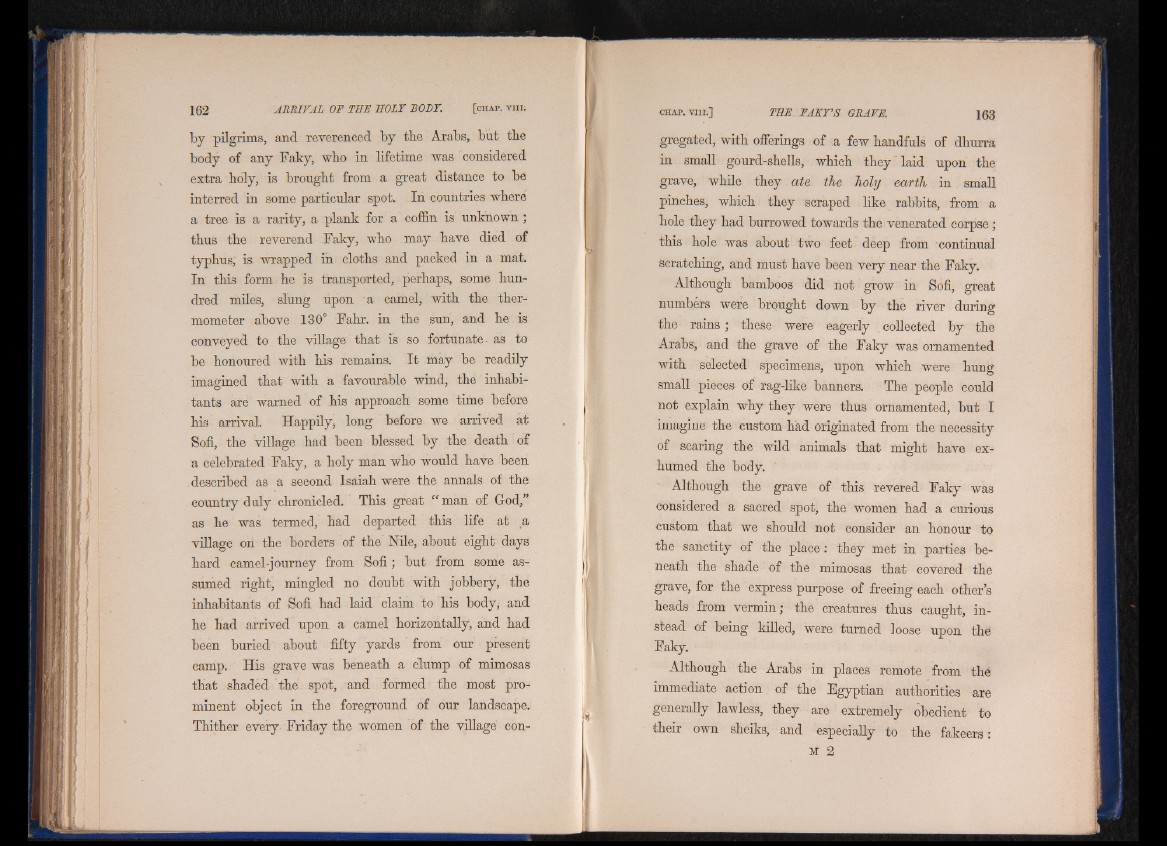
by pilgrims, and reverenced by the Arabs, but the
body of any Faky, who in lifetime was considered
extra holy, is brought from a great distance to be
interred in. some particular spot. In countries where
a tree is a rarity, a plank for a coffin is unknown;
thus the reverend Faky, who may have died of
typhus, is wrapped in cloths and packed in a mat.
In this form he is transported, perhaps, some hundred
miles, slung upon a camel, with the thermometer
above 130° Fahr. in the sun, and he is
conveyed to the village that is so fortunate- as to
be honoured with his remains. It may be readily
imagined that with a favourable wind, the inhabitants
are warned of his approach some time before
his arrival. Happily, long before we arrived at
Sofi, the village had been blessed by the death of
a celebrated Faky, a holy man who would have been
described as a second Isaiah were the annals of the
country duly chronicled. This great “ man of God,”
as he was termed, had departed this life at a
village on the borders of the Nile, about eight days
hard camel-journey from Sofi; but from some assumed
right, mingled no doubt with jobbery, the
inhabitants of Sofi had laid claim to his body, and
he had arrived upon a camel horizontally, and had
been buried about fifty yards from our present
camp. His grave was beneath a clump of mimosas
that shaded the spot, and formed the most prominent
object in the foreground of our landscape.
Thither every Friday the women of the village congregated,
with offerings of a few handfuls of dhurra
in small gourd-shells, which they laid upon the
grave, while they ate the holy earth in small
pinches, which they scraped like rabbits, from a
hole they had burrowed towards the venerated corpse ;
this hole was about two feet deep from continual
scratching, and must have been very near the Faky.
Although bamboos did not grow in Sofi, great
numbers were brought down by the river during
the rains ; these were eagerly . collected by the
Arabs, and the grave of the Faky was ornamented
with selected specimens, upon which were hung
small pieces of rag-like banners. The people could
not explain why they were thus ornamented, but I
imagine the custom had originated from the necessity
of scaring the wild animals that might have exhumed
the body.
Although the grave of this revered Faky was
considered a sacred spot, the women had a curious
custom that we should not consider an honour to
the sanctity of the place : they met in parties beneath
the shade of the mimosas that covered the
grave, for the express purpose of freeing each other’s
heads from vermin; the creatures thus caught, instead
of being killed, were turned loose upon the
Faky.
Although the Arabs in places remote from thé
immediate action of the Egyptian authorities are
generally lawless, they are extremely obedient to
their own sheiks, and especially to the fakeers :
M 2